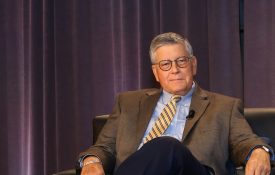-
How to Be a More Patient Person
My jaw clenches when Hulu videos buffer. I huff and puff when stuck in a sluggish line at a coffee shop. Slow cars in the fast lane send me into a curse-filled tizzy. I’m ashamed how quickly I lose my cool over these minor things. I’ve often wished I could be a more patient person, but it’s overwhelming to know where to start. Patience, the ability to keep calm in the face of disappointment, distress or suffering, is worth cultivating. The virtue is associated with a variety of positive health outcomes, such as reducing depression and other negative emotions.
-
The ‘Unschooling’ Movement: Letting Children Lead Their Learning
Is a child who spends the day watching videos or playing in the backyard actually learning? Yes, say advocates of the "unschooling" movement. Guests Maleka Diggs, founder of Eclectic Learning Network, a secular, black and brown-centered home-education network. She unschools her 11- and 13-year-old daughters. Peter Gray, psychology professor at Boston College. Co-founder and president of the nonprofit Alliance for Self-Directed Education.
-
Wharton psychologist Adam Grant says men should learn to listen like they’re wrong
For the past seven years, Adam Grant, age 37, has been rated the top professor at The Wharton School. With a PhD in organization psychology, Grant focuses his research on mentorship, emotional labor, and gender equality, and has written extensively on these subjects. He’s the author of three books, including Option B: Facing Adversity, Building Resilience, and Finding Joy, which he recently co-wrote with Facebook executive Sheryl Sandberg. I introduced myself to Grant in 2016 at a conference where I, at age 22, was among the least important people in the room.
-

Inside the Psychologist’s Studio With Henry L. “Roddy” Roediger, III
An esteemed memory researcher discusses his life and career with his former student, Suparna Rajaram.
-
The Best Way to Build a Culture of Evidence-Based Government
Here's one of the toughest nuts to crack for any results-focused public leader: How do you strengthen and sustain a culture of evidence-based decision-making? How, in other words, do you reject the status quo in much of government, where decisions are too often made based on hunches, intuition and inertia ("That's how we've always done it") and instead use data and research to inform what works? Useful insights into that question come from agencies and jurisdictions we've seen firsthand that have taken important steps toward building a culture of evidence-based decision-making.
-
Why we often remember the bad better than the good
The Washington Post recently asked readers to anonymously share their most vivid memories, and these were some of the responses: “Sitting on my bathroom floor after my father died.” “My face being forced down to do something I didn’t want to do.” “The day I heard the voice of God in my head that said, ‘My son, you have another chance.’ It happened moments before I was going to commit suicide.” But they weren’t all about negative or difficult times. There was the person who remembered a peaceful Easter morning as a child, and the person who remembers the day they met their husband. But readers’ responses were largely retellings of trauma, or traumas turned silver linings.

